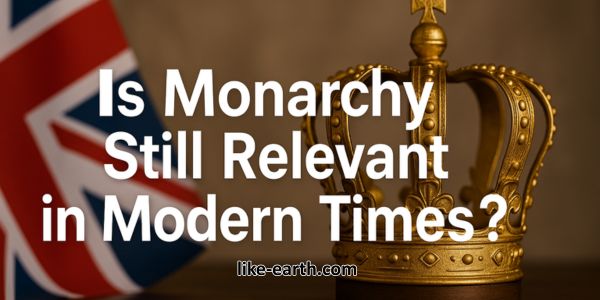Is Monarchy Still Relevant in Modern Times?

Is Monarchy Still Relevant in Modern Times? – “Is monarchy still relevant today in society?” This question often sparks debates among political analysts, historians, and everyday citizens alike. In an age dominated by democracy, human rights, and digital innovation, the existence of hereditary rule might seem like a relic of the past. Yet, monarchies continue to thrive in several countries across Europe, Asia, and the Middle East. So, what role do these ancient institutions play in the 21st century, and should they still exist?
The Evolution of Monarchy
Monarchies have been around for thousands of years. From the Pharaohs of Egypt to the British Royal Family, monarchs have shaped human history. However, the modern-day monarchy is far removed from its absolute roots. Today, most monarchies are constitutional, meaning the royal family serves a ceremonial role while the real power lies with elected officials.
Countries like the United Kingdom, Japan, and Sweden have retained their monarchs primarily as symbolic figureheads. Their responsibilities are mostly limited to state functions, diplomatic representation, and cultural preservation. Despite their reduced authority, these figures often hold significant influence in national identity and tourism.
The Cultural Significance of Monarchy
One of the strongest arguments in favor of keeping monarchies is their cultural and historical value. They serve as living symbols of national heritage, uniting citizens with shared traditions. Royal ceremonies, such as coronations and royal weddings, attract massive global attention and can even boost the economy through tourism and merchandise.
For instance, the British Royal Family contributes billions annually to the UK economy through tourism, media rights, and branding. Similar examples exist in Thailand and Japan, where the monarchy is deeply intertwined with national identity.
The Modern Monarchy’s Role in Governance
Although monarchs in democratic nations have little to no legislative power, they can still influence political stability. A monarch who acts neutrally and diplomatically can serve as a unifying force during times of political turmoil. For example, King Felipe VI of Spain played a crucial role in addressing the Catalonian independence crisis through dialogue and moderation.
Moreover, some argue that a non-partisan figurehead can balance political agendas and represent long-term national interests. This contrasts with the often short-term focus of elected officials bound by election cycles.
Arguments Against Modern Monarchy
Despite their ceremonial roles, monarchies are not without criticism. Detractors often highlight the inherent inequality of hereditary rule. In democratic societies, where equality and meritocracy are emphasized, the idea of an unelected, lifelong position of influence can seem unjust.
Additionally, maintaining royal households can be expensive. Public funds used for royal upkeep are a contentious topic, especially during economic downturns. Critics also question the accountability of royal families and argue that their wealth and privileges are out of touch with the average citizen.
Reforming the Monarchy
Rather than abolishing monarchies altogether, some suggest reforms to align them more closely with modern values. This can include greater transparency, financial audits, and voluntary public engagement. Prince William and Princess Catherine, for instance, have modernized the image of the British monarchy by actively supporting mental health initiatives and environmental causes.
Incorporating socially responsible roles can help royal families stay relevant and useful. When monarchs engage with issues like sustainability, education, and healthcare, they can foster a meaningful connection with younger generations.
Monarchy vs. Democracy: A Harmonious Coexistence?
Contrary to popular belief, monarchy and democracy are not mutually exclusive. Many stable democracies, including Canada, Norway, and Japan, function well under constitutional monarchies. The key is that the monarch remains politically neutral and supportive of democratic institutions.
This duality allows for the preservation of cultural traditions while empowering citizens through democratic participation. It represents a balanced approach where history and progress coexist.
Public Sentiment Towards Monarchies
Public opinion on monarchies varies by country and generation. While older generations may value the continuity and tradition monarchies offer, younger citizens often question their relevance. Social media and digital transparency have also increased scrutiny, making it essential for monarchs to adapt and evolve.
Surveys indicate that monarchies that embrace change, remain non-controversial, and demonstrate social value are more likely to enjoy continued public support. In contrast, those seen as outdated or wasteful risk diminishing approval. Is Monarchy Still Relevant in Modern Times?
Conclusion: Are Monarchies Still Relevant?
The question “Is monarchy still relevant today in society?” doesn’t have a one-size-fits-all answer. The relevance of monarchy depends largely on how well it adapts to modern expectations while preserving its historical essence. Monarchies that evolve, engage with the public, and remain transparent can still hold value in today’s world.
Whether through cultural preservation, national unity, or global representation, monarchies can continue to play a meaningful role. However, they must remain vigilant, responsive, and above all, aligned with the values of the societies they represent.
To explore more insights into how tradition and modernity can coexist, visit our homepage.
Stay updated and engage in lively discussions by joining our official WhatsApp Channel. Is Monarchy Still Relevant in Modern Times?



